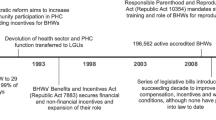Abstract
This study interviewed 364 members of four local countywide stakeholder groups (service provider agency directors, case managers, clients, and family members of clients) in a northwest state to ascertain their extent of agreement or disagreement about the importance of services. The groups agree that basic assistance and living skills are most important and that helping clients set their own goals and obtaining support from community organizations are least important. A social system stakeholder model proposes that the agreement and disagreement of different stakeholder groups are related to their values and position in the service delivery system.
Similar content being viewed by others
References
Ahr, P.R., & Holcomb, W.R. (1985). State mental health directors' priorities for mental health care.Hospital and Community Psychiatry, 36, 39–45.
Connolly, T., Conlon, E.J., & Deutsch, S.J. (1980). Organizational effectiveness: A multiple-constituency approach.Academy of Management Review, 5, 211–217.
Grob, M.C., Eisen, S.V., & Berman, J.S. (1978). Three years of follow-up monitoring: Perspective of formerly hospitalized patients and their families.Comprehensive Psychiatry, 19, 491–499.
Grusky, O., & Tierney, K. (1989). Evaluating the effectiveness of countywide mental health care systems.Community Mental Health Journal, 25(1), 3–20.
Grusky, O. (1988). Interorganizational structure and mental health service system effectiveness. Paper presented at the American Public Health Association Meeting, Boston.
Hatfield, A.B. (1979). The family as partner in the treatment of mental illness.Hospital and Community Psychiatry, 30, 338–340.
Miller, F.T. (1981). Mental health center versus community perceptions of mental health services.Journal of Community Psychology, 9, 204–209.
Morrissey, J.P., Ridgely, S., & Goldman, H.H. (1988). National evaluation of the Robert Wood Johnson Foundation Program for the Chronically Mentally Ill: Research plan for site-level evaluation. Unpublished manuscript, Center for Health Services Research, University of North Carolina, Chapel Hill, NC.
Scott, W.R., & Black, B.L. (1986).The organization of mental health services: social and community systems. Beverly Hills, CA: Sage.
Stroul, B.A. (1986).Models of community support services: approaches to helping persons with long-term mental illness. Boston, MA: Center for Psychiatric Rehabilitation, Boston University.
Sudman, S. (1976).Applied sampling. New York: Academic.
Tessler, R.C., & Goldman, H.H. (1982).The chronically mentally ill: Assessing community support systems. Cambridge, MA: Ballinger.
Torrey, E.F. & Wolfe, S.M. (1986).Care of the seriously mentally ill: A rating of state programs. Washington, DC: Public Citizen Health Research Group.
Turner, J.C., & Ten Hoor, W.J. (1978). The NIMH Community Support Program: Pilot approach to a needed social reform.Schizophrenia Bulletin, 4, 319–348.
Weiss, C.H. (1983). The stakeholder approach to evaluation: Origins and promise, in stakeholder-based education. In A.S. Bryk (Ed.)New directions for program evaluation, no. 17. San Francisco: Jossey-Bass.
Weiss, C.H. (1983). Toward the future of stakeholder approaches in evaluation, in stakeholder-based education. In A.S. Bryk (Ed.),New directions for program evaluation, no. 17. San Francisco: Jossey-Bass.
Author information
Authors and Affiliations
Additional information
This research was supported by the National Institute of Mental Health (MH-38887 and MH-14583; O. Grusky, PI and Program Director).
Rights and permissions
About this article
Cite this article
Grusky, O., Tierney, K. & Spanish, M.T. Which community mental health services are most important?. Adm Policy Ment Health 17, 3–16 (1989). https://doi.org/10.1007/BF00710743
Issue Date:
DOI: https://doi.org/10.1007/BF00710743




